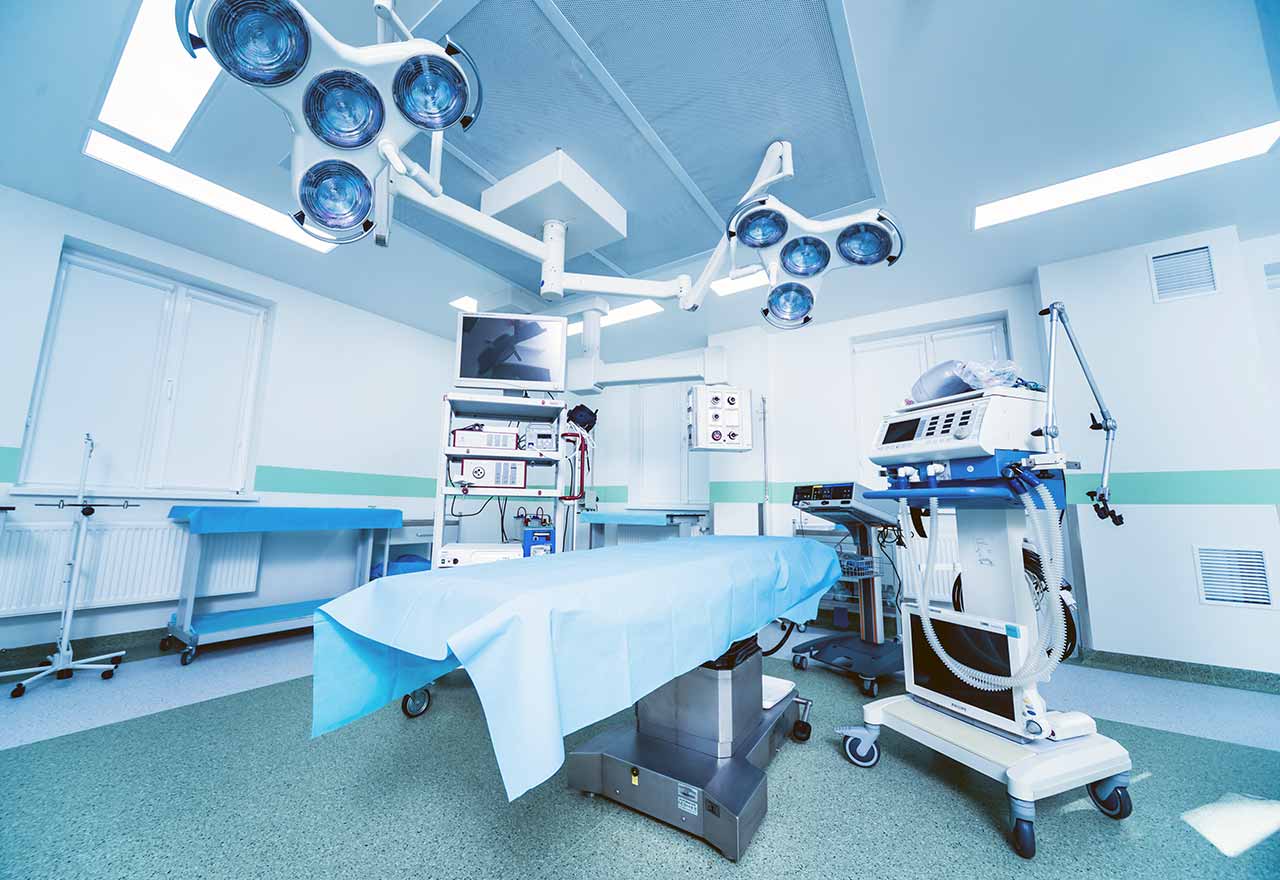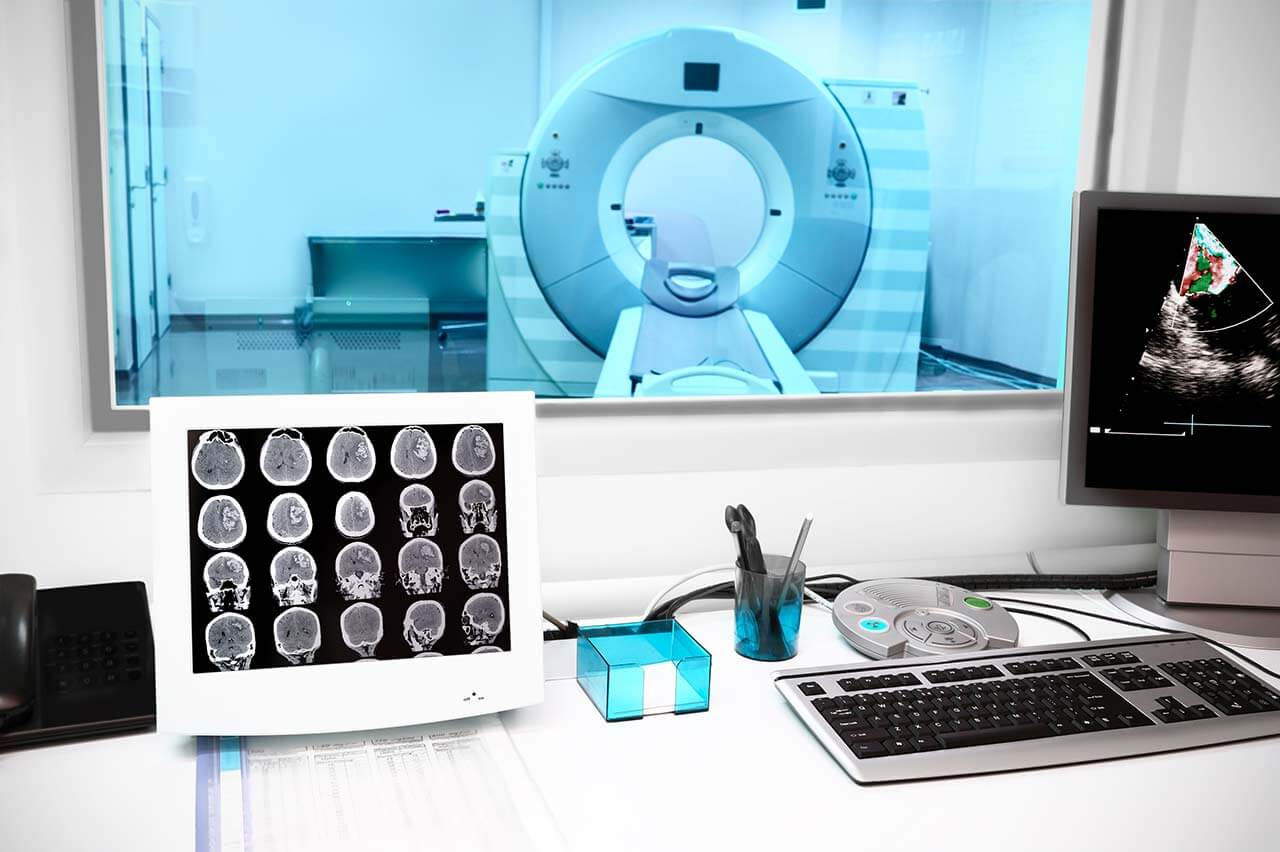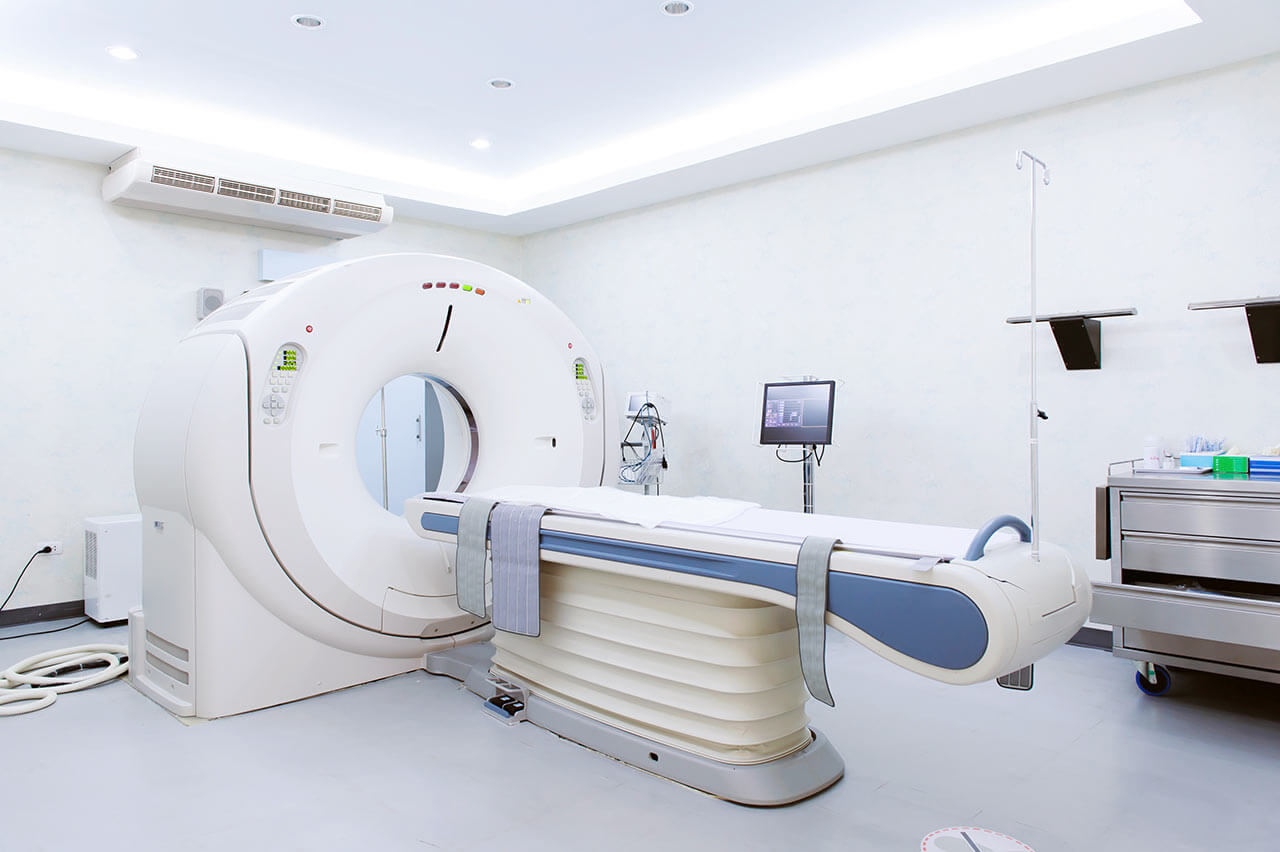
The program includes:
- Initial presentation in the clinic
- clinical history taking
- review of medical records
- physical examination
- laboratory tests:
- complete blood count
- biochemical analysis of blood
- mineral metabolism analysis (Na, K, Ca, Mg)
- lipid metabolism (HDL/LDL, cholesterol,
triglycerides Lip(a), homocysteine) - inflammation indicators (CRP, ESR)
- indicators blood coagulation
- blood gas analysis
- chest x-ray examination
- holter monitoring (24h)
- measurement of arterial blood pressure
- electrocardiogram (ECG)
- pulmonary function test
- echocardiography
- doppler echocardiography
- high-resolution computed tomography (HR-CT)/MRI (on indication 950/1200€)
- CT angiography (on indication 1350€)
- nursing services
- consultation of related specialists
- treatment by chief physician and all leading experts
- explanation of individual treatment plan
(the cost of medicines is not included)
Required documents
- Medical records
- Echocardiography (if available)
Service
You may also book:
 BookingHealth Price from:
BookingHealth Price from:
About the department
The Department of Pediatric Cardiology and Cardiac Surgery for Congenital Heart Disease at the University Hospital Hamburg-Eppendorf provides a full range of modern diagnostics and treatment in its specialties according to the highest standards of university medicine. The department provides qualified medical care for young patients with congenital and acquired cardiac pathologies. Adults with congenital heart defects are also treated here – the medical facility has the status of a supraregional Center for Congenital Heart Disease in adults, certified by the German Cardiac Society (DGK), the German Society for Pediatric Cardiology (DGPK), and the German Society for Thoracic and Cardiovascular Surgery (DGTHG). Patients' health is in the safe hands of a highly qualified team of physicians, including cardiologists, cardiac surgeons, and specially trained nurses. The main goal of the doctors is to provide each child with effective treatment, taking into account their individual needs, and to give them the opportunity to live a full life. The department has a powerful technical base and comfortable infrastructure. It uses classical and innovative methods of treatment available only in the best heart centers in Europe. The department treats more than 4,000 young patients a year, most of them on an outpatient basis. The department has 237 beds, including 40 beds in the intensive care unit. The department is headed by Prof. Dr. med. Rainer Gerhard Kozlik-Feldmann.
In the field of pediatric cardiology, physicians often perform comprehensive diagnostic examinations of children and adolescents under the age of 18 when they suspect heart disease and choose a conservative treatment regimen. For a complete assessment of the anatomical structure and functions of the cardiovascular system in young patients, the department offers echocardiography, electrocardiography, spiroergometry, bicycle ergometry, electrophysiological studies, cardiac catheterization, computed tomography, and cardiac magnetic resonance imaging. The set of diagnostic measures is determined by the attending physician after a clinical examination of the child and analysis of his medical history and complaints. All cardiological diagnostic procedures are performed on state-of-the-art medical equipment, taking into account the needs of young patients. Based on the results of a complete examination of the child, the pediatric cardiologists, together with the cardiac surgeons, begin to develop an optimal treatment plan. Whenever possible, conservative and interventional catheter-based procedures are preferred, with surgery considered as a last-line treatment.
The clinical focus of the pediatric cardiac surgery team is the surgical treatment of congenital heart disease in children. More than 430 young patients with heart defects of varying severity are operated on here each year. The department's cardiac surgeons excel at operating on children with atrial septal defect, ventricular septal defect, hypoplastic left heart syndrome, coarctation of the aorta, patent ductus arteriosus, patent truncus arteriosus, transposition of the great vessels, tetralogy of Fallot, and other congenital heart defects. It should be noted that operations are also performed on premature babies weighing only 500 grams. These interventions are considered particularly complex and require exceptional professionalism and impressive experience of the surgeon. Most operations for congenital heart defects in children are performed using sparing minimally invasive and hybrid surgical techniques. Each surgical procedure on the heart is carefully planned in order to eliminate risks for the child.
The therapeutic offer of the department is complemented by the consultation and treatment of congenital heart defects in adults. For this purpose, there is a specialized center that has been awarded quality certificates by the German Cardiac Society (DGK), the German Society for Pediatric Cardiology (DGPK), and the German Society for Thoracic and Cardiovascular Surgery (DGTHG). The healthcare facility treats approximately 1,000 patients with congenital heart defects annually in inpatient and outpatient settings. An interdisciplinary team of doctors, consisting of adult cardiologists and cardiac surgeons, works with this group of patients.
The main areas of clinical activity of the department are as follows:
- Diagnostics and treatment of congenital heart defects
- Diagnostics and treatment of atrial septal defect
- Diagnostics and treatment of ventricular septal defect
- Diagnostics and treatment of hypoplastic left heart syndrome
- Diagnostics and treatment of coarctation of the aorta
- Diagnostics and treatment of patent ductus arteriosus
- Diagnostics and treatment of truncus arteriosus
- Diagnostics and treatment of transposition of the great arteries
- Diagnosis and treatment of tetralogy of Fallot
- Diagnostics and treatment of heart arrhythmias
- Diagnostics and treatment of cardiac manifestations of Marfan syndrome
- Diagnostics and treatment of heart failure
- Diagnostics and treatment of pulmonary hypertension
- Diagnostics and treatment of other cardiovascular diseases in children
The range of diagnostic and therapeutic services provided by the department includes the following:
- Diagnostic options
- Echocardiography
- Electrocardiography
- Spiroergometry
- Bicycle ergometry
- Electrophysiological studies
- Cardiac catheterization
- Computed tomography
- Cardiac magnetic resonance imaging
- Ambulatory blood pressure monitoring (ABPM)
- Therapeutic options
- Drug therapy
- Interventional catheter-based therapy
- Surgical treatment – mainly sparing minimally invasive and hybrid surgical techniques are used
- Other medical services
Curriculum vitae
Higher Education
- 27.09.1999 Theoretical foundations of the specialty in radiation protection in X-ray diagnostics.
- 05.05.1999 Specialization in Pediatric Cardiology.
- 01.10.1997 Board certification in Pediatrics.
- 24.02.1989 Thesis defense, summa cum laude, Department of Pediatric Cardiology, Heinrich Heine University Duesseldorf. Subject: "The influence of the Cooley-Waterston anastomosis on the pulmonary artery system in patients with tetralogy of Fallot".
- 1981 - 1987 Medical studies, Faculty of Medicine, Heinrich Heine University of Duesseldorf.
Professional Career
- Since 01.10.2014 Head Physician, Department of Pediatric Cardiology and Cardiac Surgery for Congenital Heart Disease, University Hospital Hamburg-Eppendorf.
- 09.2001 - 07.2014 Deputy Head Physician, Department of Pediatric Cardiology and Cardiac Surgery for Congenital Heart Disease, University Hospital Hamburg-Eppendorf.
- 01.2000 - 09.2014 Managing Senior Physician, Department of Pediatric Cardiology and Cardiac Surgery for Congenital Heart Disease, University Hospital Hamburg-Eppendorf.
- 11.1998 - 12.2003 Senior Physician, Department of Pediatric Intensive Care (focus on pediatric cardiology and neurosurgery), University Hospital of Ludwig Maximilian University of Munich.
- Since 01.11.1998 Senior Physician, Department of Pediatric Cardiology and Pediatric Intensive Care, University Hospital of Ludwig Maximilian University of Munich.
- 1995 - 1998 Research Fellow, Department of Pediatric Cardiology and Pediatric Intensive Care, University Hospital of Ludwig Maximilian University of Munich.
- 1991 - 1995 Research Fellow, Children's Outpatient Clinic, University Hospital of Ludwig Maximilian University of Munich.
- 1990 - 1991 Research Fellow, Department of Pediatric and Adolescent Medicine, University Hospital Duesseldorf.
- 1988 - 1990 Research Fellow (project of the German Research Foundation), Department of Pediatric and Adolescent Medicine, University Hospital Duesseldorf.
Qualifications
- 05.12.2018 Professor at the University of Hamburg.
- 17.12.2014 Venia legendi, Faculty of Medicine, University of Hamburg.
- 24.09.2012 Optional advanced training in Special Pediatric Intensive Care.
- 24.03.2012 Additional genetic counseling qualification.
- 24.07.2009 Additional qualification "Adults with congenital heart defects".
- 17.07.2009 Venia legendi, Ludwig Maximilian University of Munich.
- 24.06.2009 Venia legendi in Pediatric and Adolescent Medicine, Ludwig Maximilian University of Munich.
Memberships in Professional Societies
- German Society for Pediatric and Adolescent Medicine (DGKJ).
- German Society for Pediatric Cardiology (DGPK).
- Association for European Paediatric and Congenital Cardiology (AEPC).
- German Cardiac Society (DGK).
- European Society of Cardiology (ESC).
Photo of the doctor: (c) Universitätsklinikum Hamburg-Eppendorf (UKE)
About hospital
According to the Focus magazine, the University Hospital Hamburg-Eppendorf is one of the top ten hospitals in Germany!
Since its foundation in 1889, the hospital has taken a leading position in the European medical arena, which it still holds today. A highly competent medical team of more than 15,300 employees takes care of the health of patients. Approximately 2,900 of them are physicians and researchers, and more than 3,400 work as nurses and therapists. The hospital has 1,738 beds for inpatient treatment, and many diagnostic and therapeutic services are provided on an outpatient basis. A solid foundation for successful clinical practice in the medical complex is formed by a combination of research achievements with state-of-the-art equipment and the highest professionalism of doctors. In addition, the hospital has a modern and extremely comfortable infrastructure. The most important value for every employee of the University Hospital Hamburg-Eppendorf is the health and well-being of every patient.
The medical facility was the first university hospital in Europe to implement an electronic system for storing patient medical reports. As a result, all diagnostic and treatment protocols are stored electronically. In 2011, the hospital was certified as the first fully digital hospital in Europe.
The hospital represents all areas of modern medicine. The doctors of the healthcare facility have a wealth of theoretical knowledge and vast clinical experience, which allows them to easily cope with the treatment of both common and extremely rare, complex clinical cases. About 550,000 patients are treated here each year, over 450,000 of whom receive outpatient medical care.
An important part of the work of the University Hospital Hamburg-Eppendorf is research activities aimed at developing innovative diagnostic and treatment methods. The main areas of research of the hospital include neurobiology, oncology, cardiovascular research, and research on infectious and inflammatory diseases. Special attention is also given to research in molecular imaging and skeletal biology.
The hospital is distinguished by its first-class level of medical care, which is confirmed by numerous quality certificates of European and international standards: DIN EN IS0 9001 certificate, certificates of the German Cancer Society (DKG) in the treatment of breast cancer, colon cancer, gynecological cancer, prostate cancer, and other oncological diseases, certificate of the German Cardiac Society (DGK) in the treatment of acute coronary syndrome, certificate of the German Spine Society (DWG), and others.
Photo: (с) depositphotos
Accommodation in hospital
Patients rooms
The patients of the University Hospital Hamburg-Eppendorf stay in comfortable single and double bright rooms with a modern design. Each patient room has an ensuite bathroom with a shower and a toilet. The standard patient room furnishings include an automatically adjustable bed with an orthopedic mattress, a bedside table, a wardrobe, a table and chairs for receiving visitors, a telephone, a radio, and a TV. Wi-Fi access is available in patient rooms and throughout the hospital.
If desired, patients can stay in single enhanced-comfort rooms. These rooms are more spacious and are equipped with upholstered furniture, a safe, and a mini-fridge.
Meals and Menus
The hospital offers three meals a day: breakfast, lunch, and dinner. Breakfast and dinner are served in the form of buffets, and for lunch you can choose from several set menus – in total, more than 20 dishes are served for lunch, including vegetarian ones.
If, for some reason, you cannot eat all of the foods, you will be offered an individual menu. Please inform the medical staff about your dietary preferences prior to the treatment.
Further details
Standard rooms include:
![]() Toilet
Toilet
![]() Shower
Shower
![]() Wi-Fi
Wi-Fi
![]() TV
TV
Religion
Religious services are available upon request.
Accompanying person
During the inpatient program, an accompanying person may stay with you in a patient room or hotel of your choice.
Hospital accommodation
During the outpatient program, you may stay in a hotel at the hospital.
Hotel
During the outpatient program, you may stay in a hotel of your choice. Managers will help you choose the most suitable options.
The hospital offers a full range of laboratory tests (general, hormonal, tests for infections, antibodies, tumor markers, etc.), genetic tests, various modifications of ultrasound scans, CT scans, MRI and PET / CT, angiography, myelography, biopsy and other examinations. Treatment with medications, endoscopic and robotic operations, stereotaxic interventions is carried out here, modern types of radiation therapy are also used. The hospital offers patients all the necessary therapeutic techniques.
- Coiling and clipping of aneurysms of different localizations
- Transjugular intrahepatic portosystemic shunting in patients with portal hypertension
- Minimally invasive surgeries (da Vinci)
- Removal and reconstruction of mammary glands
- Hyperthermic intraperitoneal chemotherapy (HIPEC)
These are arteriovenous malformations and angiomas, vascular aneurysms, pathologies of the mammary glands, pelvic organ prolapse, urinary incontinence, malignant tumors of various localizations (area of special attention is treatment of intestinal cancer), pathologies of liver and pancreas, cataracts and rare ophthalmic pathologies (aphakia, aniridia ), infertility and other diseases.
- Interventional neuroradiology
- Mammology
- Oncology
- Gastroenterology
- Surgery
Over 2,900 highly qualified physicians and researchers work at the hospital.





